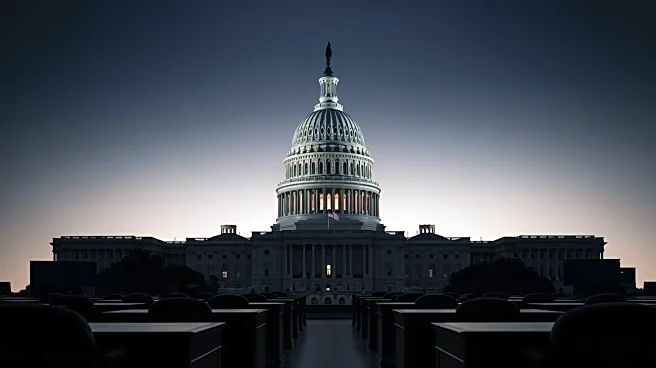What's Happening?
The U.S. Senate failed to pass a stopgap funding bill on October 14, extending the partial federal government shutdown to two weeks. The bill, which aimed to extend government funding until November 21, was defeated in a 49-45 vote, falling short of the required
60 votes. The main point of contention between parties is the expiration of health insurance subsidies linked to the Affordable Care Act. Democrats are pushing for the extension of these subsidies before enrollment begins on November 1, while also seeking assurances from the White House against unilateral spending cancellations. The Senate is scheduled to reconvene and vote again on October 15, marking the ninth voting session on the funding bill.
Why It's Important?
The ongoing government shutdown has significant implications for U.S. politics and public policy. The deadlock over healthcare funding and tax credits could lead to increased insurance premiums for millions if not resolved. The shutdown affects various government operations and services, potentially impacting federal employees and contractors. The political standoff highlights the challenges in bipartisan cooperation, with potential consequences for upcoming elections. President Trump's stance and actions during the shutdown could influence Republican unity and negotiations with Democrats, affecting the broader political landscape.
What's Next?
The Senate is set to vote again on October 15 in an attempt to pass a GOP-backed funding bill to reopen the government. The outcome of this vote could determine the duration of the shutdown. Democratic lawmakers may shift their positions to prevent further damage, especially with some facing reelection. President Trump plans to announce eliminated Democratic programs, which could further complicate negotiations. The situation remains fluid, with potential shifts in party dynamics and public pressure influencing the next steps.
Beyond the Headlines
The shutdown underscores deeper issues in U.S. governance, such as the polarization over healthcare policy and fiscal management. The political maneuvering during the shutdown could have long-term effects on party strategies and voter perceptions. Ethical considerations arise from the impact on federal workers and the public, highlighting the need for effective leadership and compromise in resolving such crises.

















